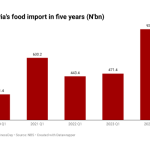As part of its plans to achieve food security by boosting farmers’ production, the Federal Government on Tuesday launched varieties of the newly released transgenic maize called Tela. This genetically modified maize is drought-tolerant, fall armyworm pest-resistant, and can triple its yield from 2-3 tons per hectare to about 9-10 tons per hectare.
Developed at the Institute for Agricultural Research (IAR) in partnership with the African Agricultural Technology Foundation (AATF), the Bill and Melinda Gates Foundation, and other partners, Tela maize aims to significantly improve agricultural productivity.
At the launch in Abuja, the Minister of State for Agriculture and Food Security, Senator Aliyu Sabi Abdullahi, emphasized the government’s commitment to promoting the welfare, health, and security of its citizens. He praised the yield potential of the new maize variety, aligning it with President Bola Tinubu’s administration’s goal of ensuring sufficient food for Nigerians.
Senator Abdullahi assured that the government would only undertake initiatives that benefit citizens, acknowledging that while new technologies often face pushback, Tela maize’s high yield and pest resistance make it a valuable innovation.
The Executive Director of AATF, Dr. Canisius Kanangire, commended the Nigerian government for supporting the Tela Maize Project. He highlighted the collaboration between government bodies, AATF, and the private sector in promoting agricultural innovation. Kanangire noted that Tela maize varieties would boost yields, reduce pesticide use, and make farming more profitable and sustainable.
Professor Ado Adamu Yusuf, Executive Director of IAR, explained that Tela maize offers three-in-one protection: drought tolerance, resistance to fall armyworm, and resistance to stemborer insect pests. This triple protection ensures higher yields and reduces the need for chemical pesticides, saving farmers money and reducing environmental and health risks.
In summary, the launch of Tela maize marks a significant step towards agricultural innovation and resilience in Nigeria, promising enhanced food security and economic benefits for farmers.





